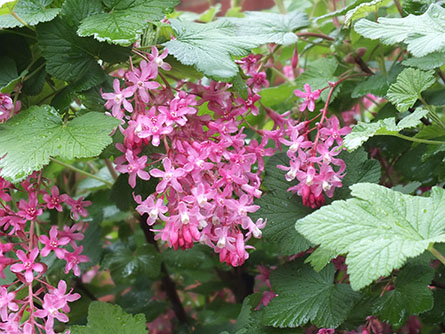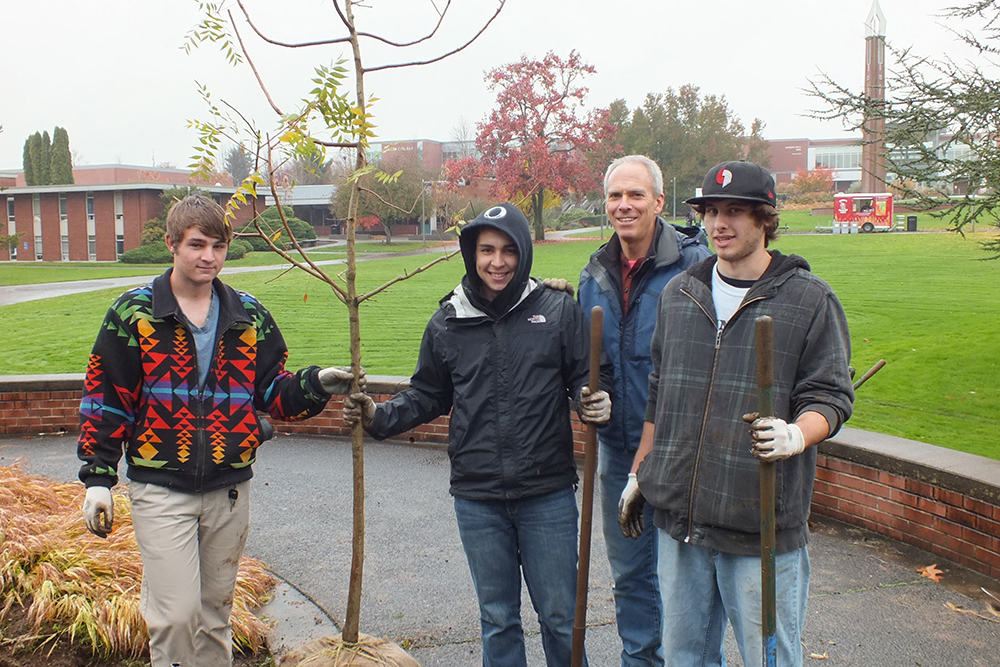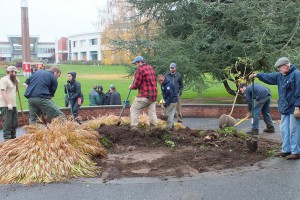Environmental Science
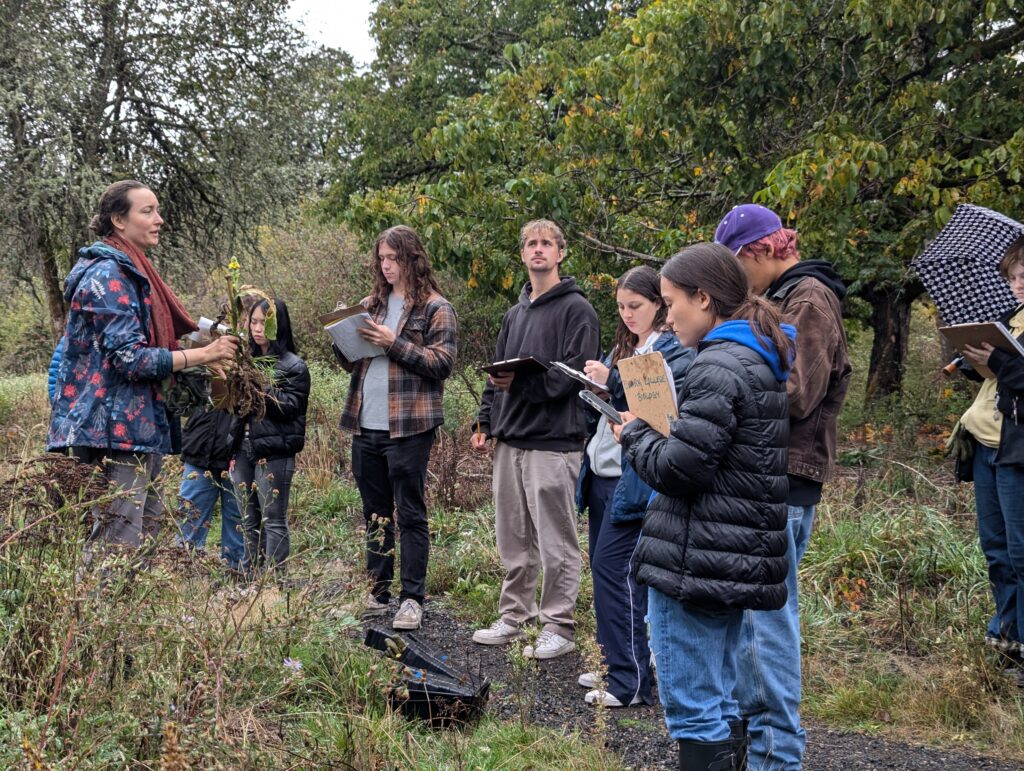
On a misty, rainy morning in October, Josie Lesage’s Environmental Science 101 students gathered around her in the gravel parking lot at Sams Walker Recreation Area near Skamania Landing in the Columbia River Gorge, about 34 miles from the Clark College main campus.
Lesage distributed gardening gloves and asked for volunteers to carry supplies to the work site. One student carried a bucket of garden spades. Others carried flats of Canada goldenrod. The native plants are grown by Clark students in Environmental Biology/Biology 101 classes at the Native Plant Center’s greenhouse. As they hiked along a gravel trail, Lesage stopped to point out a field that previous Clark students had seeded with native plants.
“Clark students have been involved with a habitat restoration project here for the past two years,” says Clark Professor Kathleen Perillo, Environmental Science and Biology, and co-director of the college’s Native Plant Center. Students gain hands-on experience learning about and working with native plants at the Native Plant Center and planting them at the U.S. Forest-managed restoration sites in the Columbia River Gorge.
This restoration effort is a partnership with Clark College, the U.S. Forest Service, and The Center for Ecodynamic Restoration, a nonprofit organization based in Washougal.
Restoring habitat
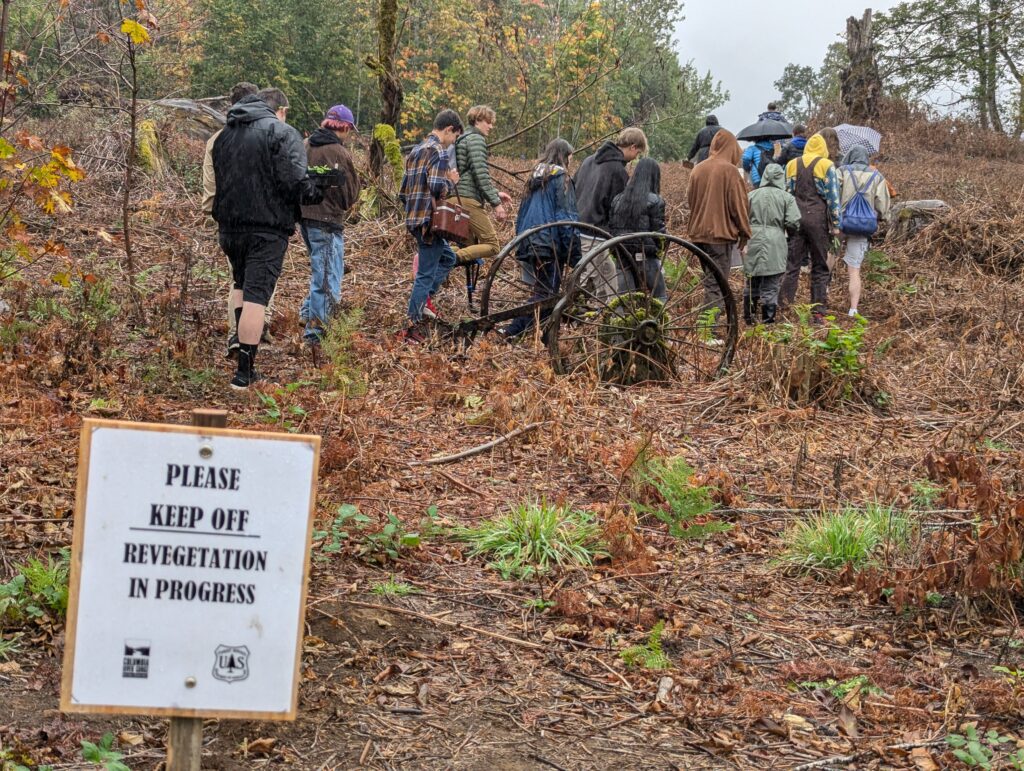
After Lesage demonstrated the preferred planting technique, the group stepped off the trail and passed a sign that read: “Please keep off. Revegetation in progress.” As they walked uphill to the planting area, they snaked around a rusty relic of farm equipment, its iron wheels encased with thick moss. This artifact and a crumbling foundation are the few remaining remnants of the farms operated by the Sams and Walker families on this land in another era.
But much more recently, this entire area—the field and adjacent wooded areas—was overgrown with non-native invasive species including reed canary grass, pasture grasses, and towering Himalayan blackberry plants. Now, the ground is covered in decomposing blackberry canes. Over the past two years, Clark students and other volunteers have begun planting non-invasive native plants. Fields are sewn with a mix of 33 different native species including Canada goldenrod, western yarrow, streambank lupine, bigleaf lupine, Douglas aster, milkweed, and more.
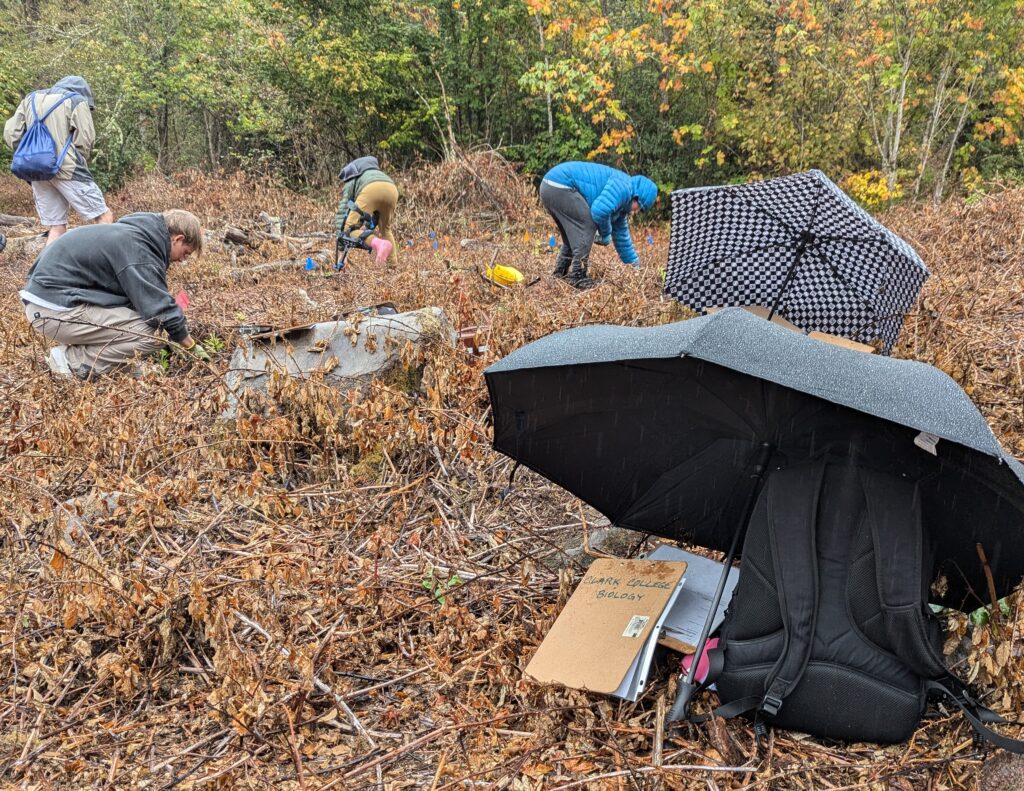
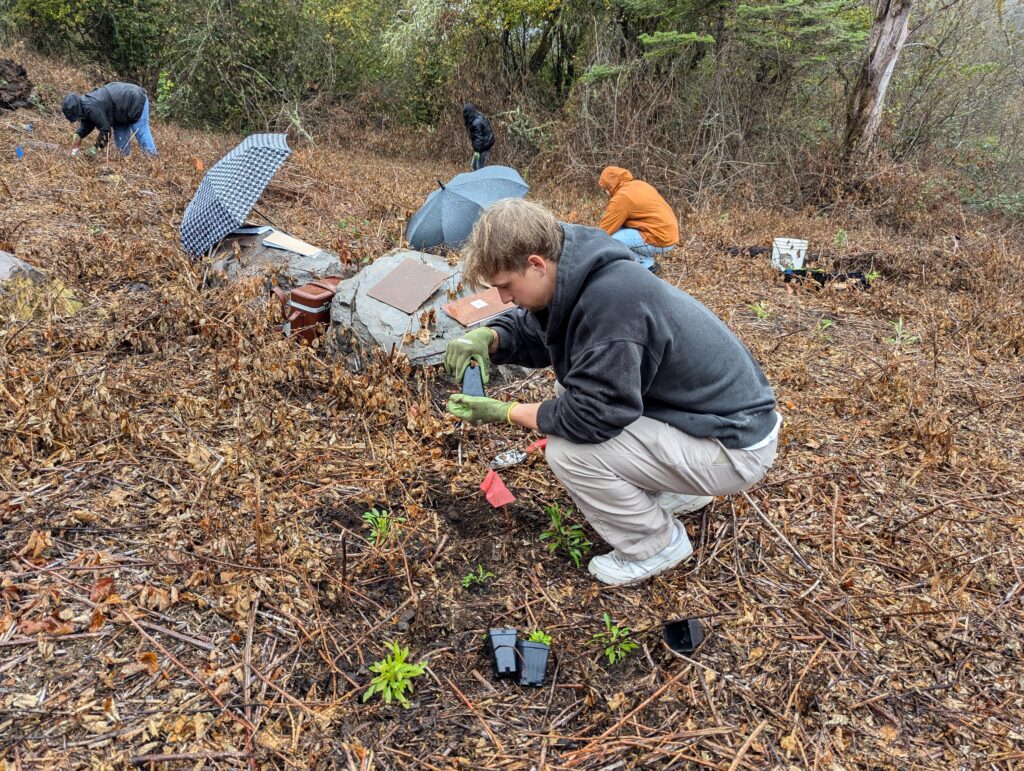
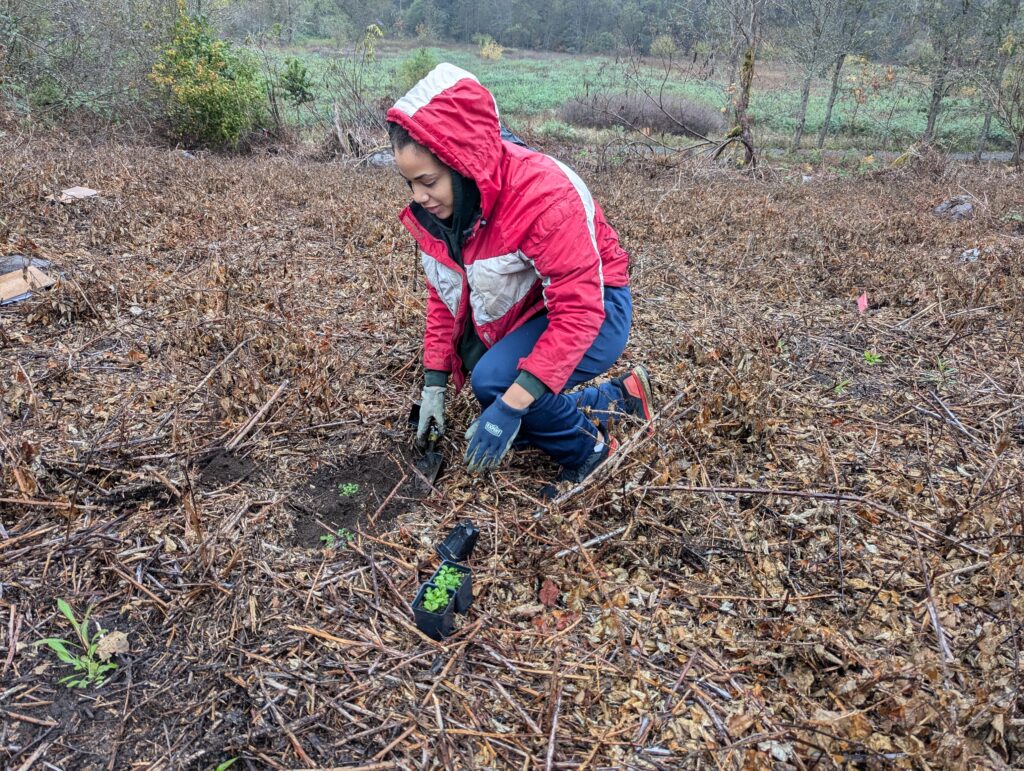
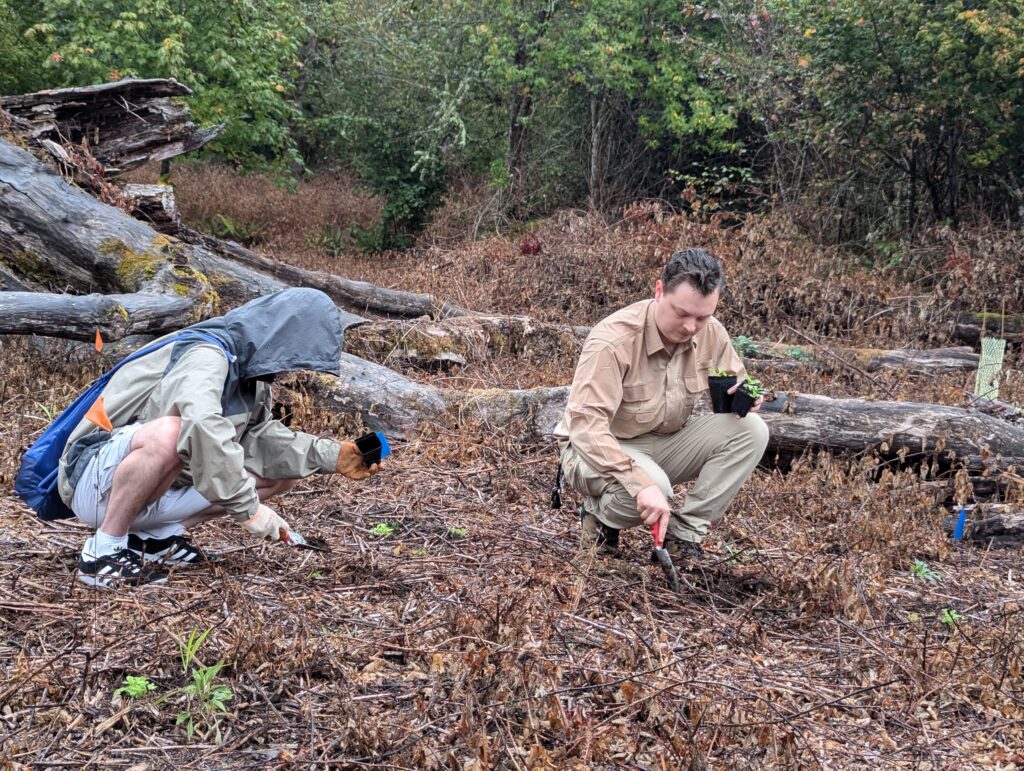
Reaching a broad hillside, the group stopped while Lesage offered final instructions. Setting down their umbrellas, backpacks, and clipboards, the students carried pots of Canada goldenrod all along the field, then knelt on the rain-soaked ground and got to work.
With so many hands working, the planting was soon completed. Although these plants are tiny now, they soon will mature and reseed with the help of the wind and birds. To demonstrate how quickly this transformation can occur, Lesage led her students over the hill and stood amid a thriving native landscape students had planted two years earlier.
Sams Walker Recreation Area
Sandy Haigh, a former Clark College biology professor, is the president of The Center for Ecodynamic Restoration (CEDR). She manages the restoration project at Sams Walker Recreation Area, which was established by the U.S. Forest Service in the 1990s. Working with the Forest Service, Clark College, and other partners, CEDR works to restore native habitats at the site. The project is funded with National Forest Foundation grants to CEDR.
Haigh defined ecological restoration as the process of restoring damaged or disturbed ecosystems to their natural state. CEDR works closely with Clark College Native Plant Center. Biology students propagate native plants in the campus greenhouse. Then professors Lesage and Perillo’s environmental science students plant the native species at Sams Walker and at St. Cloud, another project two miles west. This cooperative work introduces students to ecology, demonstrates the role of natives in ecological systems, and encourages them to enter related fields of work.
Perillo said, “We want our students to learn what a healthy Pacific Northwest ecosystem looks like and what it takes to restore it. We are teaching them about native plants and their role in native systems. But it goes beyond that to be able to show how a healthy system starts from the ground up and goes from soils to plants to pollinators on up to our apex predators. Everything in the system relies on everything else. That’s an important takeaway.”
She added, “We also want to empower students to see that they can be a part of worthwhile work in restoring systems and even take that knowledge back to their own backyards. It’s a way to tackle some of the nihilism that infuses many of our students in the face of climate change and the biodiversity crisis.”
Becoming an Environmental Scientist
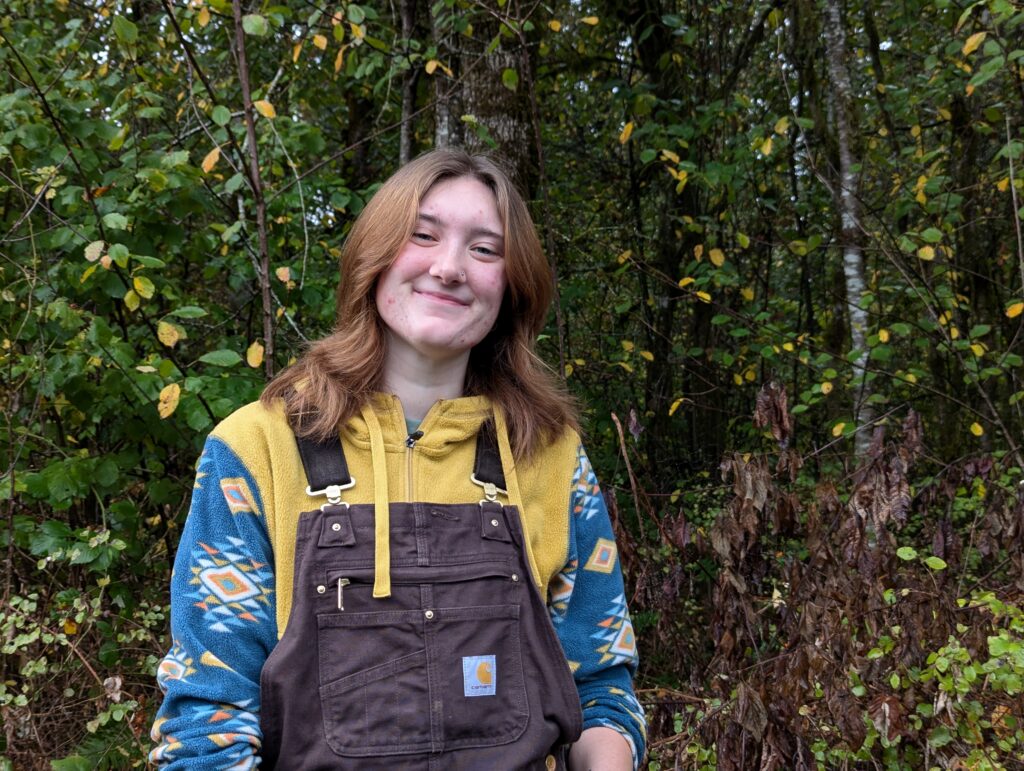
First-year Clark student Kylie Miller (pictured above), one of the students who participated in the restoration work at Sams Walker, is pursuing a career as an environmental scientist. “I chose this field because I grew up in Southern Oregon and constantly being in nature made me a proud tree hugger.”
Miller grew up hiking, kayaking, snowboarding, gardening “and doing just about anything outdoors I could.” In high school, she took environmental science classes and was inspired by her teacher to pursue a career in the field. She helped start an environmental activism group, worked toward restoring the campus greenhouse, and planned local cleanups.
She chose Clark College for its strong environmental science program and because she was recruited to play volleyball for the Penguins. Miller is pursuing an associate transfer degree in environmental science and plans to earn her bachelor’s degree at Oregon State University, University of Oregon or Washington State University.
Miller said the planting project at Sams Walker Recreation Area “was a great experience to get a taste of what it would really be like to work in the field. I know for a fact I want to be hands on and in the field making change and impacting the ecosystems I’m working with for the better.”
Learn more
- Call to action: Volunteer at the October 26 work party at Sams Walker Recreation Area. Click here to sign up.
- Visit the site:
- Sams Walker Day Use/Picnic Area: Located 34 miles from Clark College and 12 miles east of Stevenson, Washington.
- Directions: No street address. Take Washington State Highway 14 west into the Columbia River Gorge. Turn right at milepost 32.8 onto Skamania Landing Road. Drive ¼ mile, crossing the railroad tracks. Turn right into the parking lot.
- Amenities: Trails, toilet, picnic table. NW Forest Pass required. Learn more here.
- Learn more:
- Project partner The Center for Ecodynamic Restoration, Washougal.
- Habitat restoration at the Sams Walker Recreation Site near Skamania Landing along Highway 14 in the Columbia River Gorge here.
Photos: Clark College/Susan Parrish
